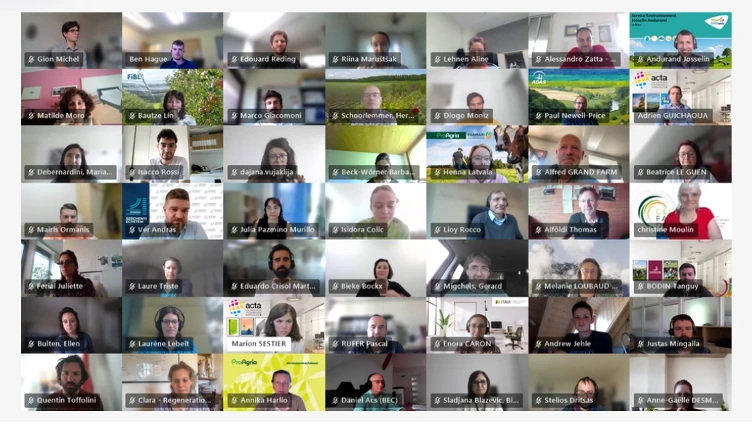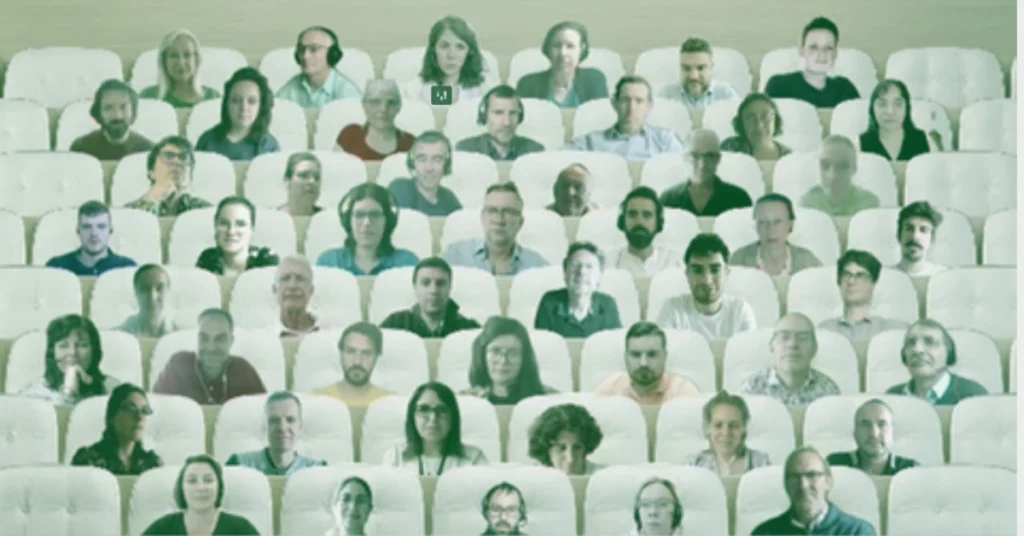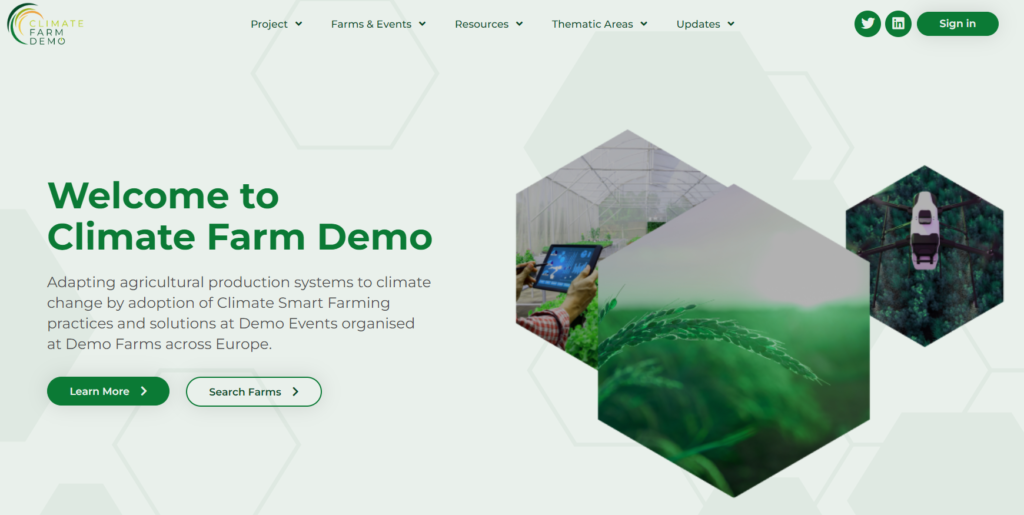“Congratulations to all our partners: Pilot DEMO Farmers, National Coordinators, and Climate Farm Advisors first and foremost for having risen to the challenge of committing themselves fully to the project. We still have a few months to finalise the audits and the adaptation and mitigation plans and lay the foundations for our concrete Climate Smart Farming Practices. The first DEMO campaign has begun and we can all be very enthusiastic about what’s to come!”, said Christine Berger–project coordinator.
On June 4, 2024, Christine Berger–Climate Farm Demo project coordinator, together with Marion Sestier and Adrien Guichaoua–ACTA, opened the Midterm Annual Meeting with an engaging plenary session. This session set the stage for two intensive afternoons dedicated to evaluating the project’s progress, sharing practical insights, and preparing for the project’s second phase focused on demonstrations.
Christine Berger began by emphasizing the importance of active participation, encouraging attendees to ask questions and engage in debates. She highlighted the central goals of the CFD project: implementing, demonstrating, and promoting the uptake of Climate Smart Farming (CSF) practices across Europe to significantly reduce greenhouse gas emissions, further adapt farming systems to climate hazards, and finally achieve EU climate targets. The session provided an overview of the project’s structure, and Christine proudly announced that all targeted farms had been recruited and registered on the platform,
Following the plenary, Workshop #1 focused on “Ways in which the CFA can support the PDF (Pilot Demonstration Farmers) on their journey to climate smart farming.” Facilitated by Tom O’Dwyer, John Greaney–Teagasc, and Isidora Colic–BioSense, this session aimed to enhance the relationship between Climate Farm Advisors and Pilot Demonstration Farms. Objectives included identifying effective support strategies for PDFs, promoting climate-smart farming practices, and addressing additional training needs for CFAs. Breakout groups provided CFAs an opportunity to share experiences and discuss best practices for building strong, trust-based relationships with PDFs. The workshop also covered the technical and relational skills necessary for CFAs to support farmers in adopting new practices, using carbon audit tools for benchmarking and guiding change. Key insights included the necessity of frequent and meaningful interactions, the role of trust and respect, and the importance of challenging farmers to improve their practices. The session concluded with a summary of strategies for successful change, stressing continuous support, communication, and the importance of building strong networks to achieve the project’s goals.
On the same day, Workshop #2, facilitated by Elena Bortolazzo, Lorena Giglio–CRPA, Annika Harlo, and Henna Latvala–ProAgria, provided practical insights on implementing and applying a mitigation and adaptation plan (AMP). The workshop began with an overview of how audits and plans can guide advisors, presented by Elena Bortolazzo. Annika Harlo discussed the procedures for transitioning from audits to AMPs, detailing the process of setting up goals, defining actions, and monitoring results. Henna Latvala shared her experience as an advisor, highlighting practical tips and challenges encountered in the field. Participants engaged in a survey to share their experiences and provide feedback. The session underscored the significance of using a common template for AMPs to ensure consistency at the farm, national, and European levels. Key components of the plan include the farm’s baseline situation, defined goals, actions to achieve these goals, timing, indicators for monitoring, and periodic revisions. The workshop also addressed the main sources of greenhouse gas emissions on farms and strategies to mitigate these emissions. This information is extremely helpful in preparing the Plan, especially when the audit has not been completed. Participants were encouraged to define clear, specific, and achievable goals with the farmers, considering the unique characteristics of each farm. A Q&A session facilitated by Lorena Giglio allowed participants to ask questions and share insights. The workshop concluded with take-home messages emphasizing the importance of meeting deadlines and uploading audits and plans to the project’s back-office system.
On June 5, 2024, Workshop #3 focused on “How to animate the national network of PDFs and CFAs?”, facilitated by András Vér and Krisztina Takács–Szechenyi Istvan Institute, and Laure Triste–ILVO. The session kicked off with feedback from the National Knowledge Exchange (KE) Plans, highlighting the hot topics related to climate action and challenges related to animating the network in each country. Soil(health) was the topic mentioned by most countries. Highlights of the workshop included valuable testimonies from National Coordinators Eduardo Crisol-Martinez (Spain), Siw Fasting (Germany), Zlatko Tomljanović (Croatia), and Riina Maruštšak (Estonia) on the successful strategies implemented to deal with challenges in their CFA and PDF network. Participants engaged in breakout room discussions to explore effective methods for network engagement. They discussed a variety of networking activities, including demonstrations, farmer groups, training workshops, and media engagements, aiming to enhance knowledge exchange and participation. The workshop concluded with an overview of upcoming tasks and responsibilities for the national networks. Emphasis was placed on continued engagement and proactive knowledge exchange to further the goals of the CFD project. This session exemplified the collaborative spirit and commitment of the CFD community towards sustainable agricultural practices.
The session on “Rewarding Mechanisms and Carbon Farming”, led by Laurène Lebelt from EIT Climate-KIC, focused on the recent policy developments, particularly the EU Carbon Removal Certification Framework (EU CRCF), and provided updates on the project’s ongoing work regarding rewarding mechanisms. The discussion aimed to address the needs and questions of Climate Farm Advisors and National Coordinators, focusing on how to effectively implement and utilize these mechanisms in climate-smart farming. Through presentations and breakout discussions, participants delved into practical aspects and strategic planning necessary to support farmers in adopting these rewarding mechanisms. This session was pivotal in equipping attendees with the knowledge and tools needed to advance carbon farming initiatives within their operations.
Thank you all for participating and heartfelt thanks to everyone who contributed to the success of this meeting.
The midterm annual meeting concluded with “Fostering the collaboration between CFD and PIPs”, facilitated by Luis Mira and Maria Mendonça–CONSULAI. This session highlighted the importance of collaborative efforts beyond the Climate Farm Demo in upscaling climate smart farming. It included a case study from Climate Farmers, represented by Fabio Volkmann, focusing on systemic thinking and leverage points, with comments from Isabel Ribeiro – NutriFarms, a partner from ClieNFarms, followed by meaningful exchanges on their strategies and success stories. The session ended with practical examples of collaboration at EU and national levels that can add value to the work developed by CFD partners.



